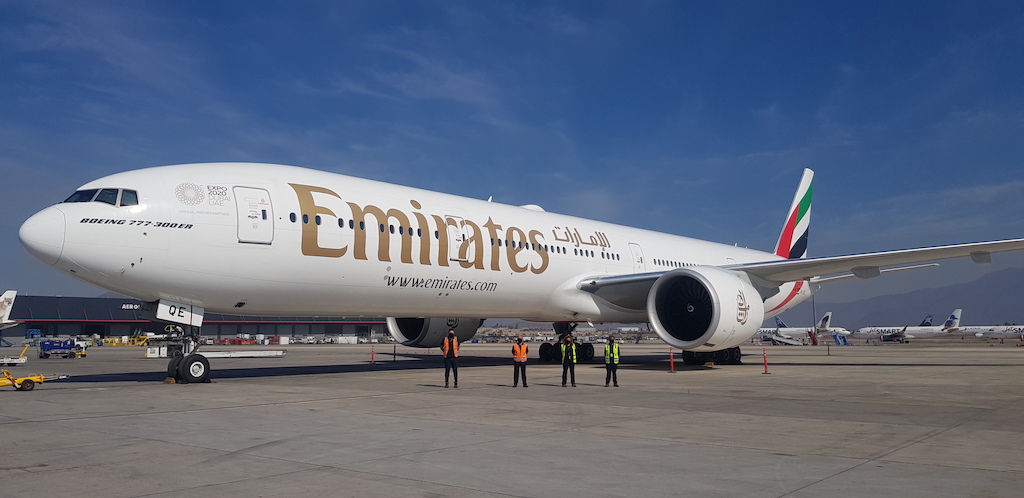
Dubai runway closure, stronger US dollar and Covid-19 see 2019/20 financial year profit fall 28%
Emirates Group announced its 32nd consecutive year of profit, against a drop in revenue mainly attributed to reduced operations during the planned Dubai International runway (DXB) closure in Q1, and the impact of flight and travel restrictions due to the COVID-19 pandemic in Q4.
The Middle East group posted a profit of AED1.7bn ($456m) for the financial year ended March 2020, down 28% from last year. The Group’s revenue reached AED104.0bn ($28.3bn), a decline of 5% over last year’s results.
The group has not declared a dividend for this financial year.
Ahmed bin Saeed Al Maktoum, chairman and chief executive, Emirates Airline and Group, said: “Even without a pandemic, our industry has always been vulnerable to a multitude of external factors.
“In 2019-20, the further strengthening of the US dollar against major currencies eroded our profits to the tune of AED1.0bn, global airfreight demand remained soft for most of the year, and competition intensified in our key markets.”
Emirates’ total passenger and cargo capacity declined by 8% to 58.6bn ATKMs at the end of 2019-20, due to the DXB runway closure and a complete suspension of passenger services due to Covid=19.
Emirates SkyCargo continued to deliver “a solid performance in a highly competitive market,” contributing to 13% of the airline’s total transport revenue.
Said an airline spokesperson: “With the lingering weakness in airfreight demand over most of the year, Emirates’ cargo division reported a revenue of AED11.2bn ($3.1bn), a decrease of 14% over last year.
“Freight yield per Freight Tonne Kilometre (FTKM), after two consecutive years of growth, declined by 2%, largely impacted by the reduction in fuel price, and a strong US dollar.”
Tonnage carried decreased by 10% to reach 2.4m tonnes, due to the capacity reduction with the retirement of one B777 freighter and reduced available bellyhold capacity in the first and last quarters of the year.
At the end of 2019-20, Emirates’ SkyCargo’s total freighter fleet stood at 11 B777Fs.
Emirates SkyCargo continued to develop “innovative, bespoke products”. In October, it launched Emirates Delivers, an e-commerce platform that helps individual customers and small businesses consolidate online purchases in the US and have them delivered in the UAE.
“More origin and destination markets” are being planned in the future, leveraging Dubai as a hub for regional e-commerce fulfilment. During the year, Emirates Skycargo also strengthened its pharma capabilities with the opening of new facilities in Chicago and Copenhagen.
dnata recorded a “sharp profit decline” (57%) to AED618m ($168m) For 2019-20. This includes a one-time gain from a transaction where dnata divested its minority stake in Accelya, an IT company that was acquired by Vista Equity Partners.
Without this one-time transaction, dnata’s profit would have been down 72% compared to the same period last year, which included a one-time gain from the sale of dnata’s stake in travel company HRG.
Comparing profit performance without both disinvestment gains from Accelya and HRG, dnata’s profit for 2019-20 would have been lower by 64% compared to previous year.
Revenue from dnata’s UAE Airport Operations, including ground and cargo handling remained steady at AED3.2bn ($864m).
The number of aircraft movements handled by dnata in the UAE declined by 11% to 188,000, reflecting the DXB runway closure in April-May 2019, and the suspension of scheduled passenger flights at both Dubai airports (DXB and DWC) due to COVID-19.
dnata’s cargo handling declined by 4% to 698,000 tonnes, impacted by lower demand in the overall air cargo market during the year, and the 45-day DXB runway closure in Q1.

